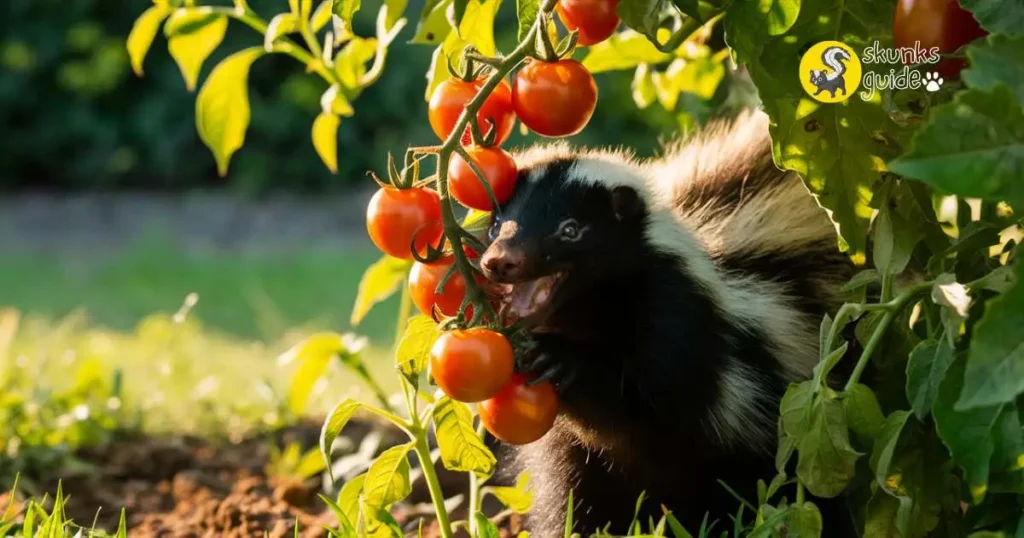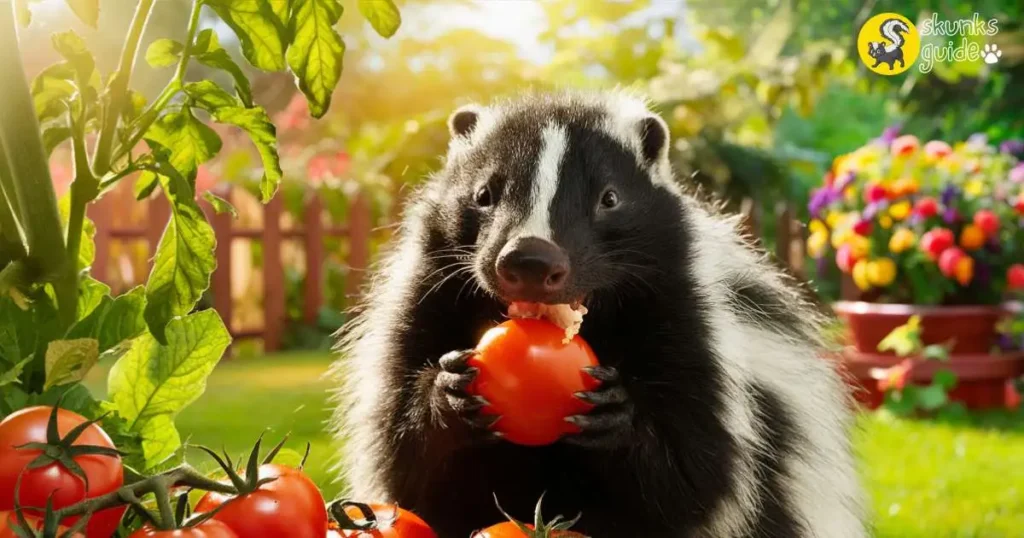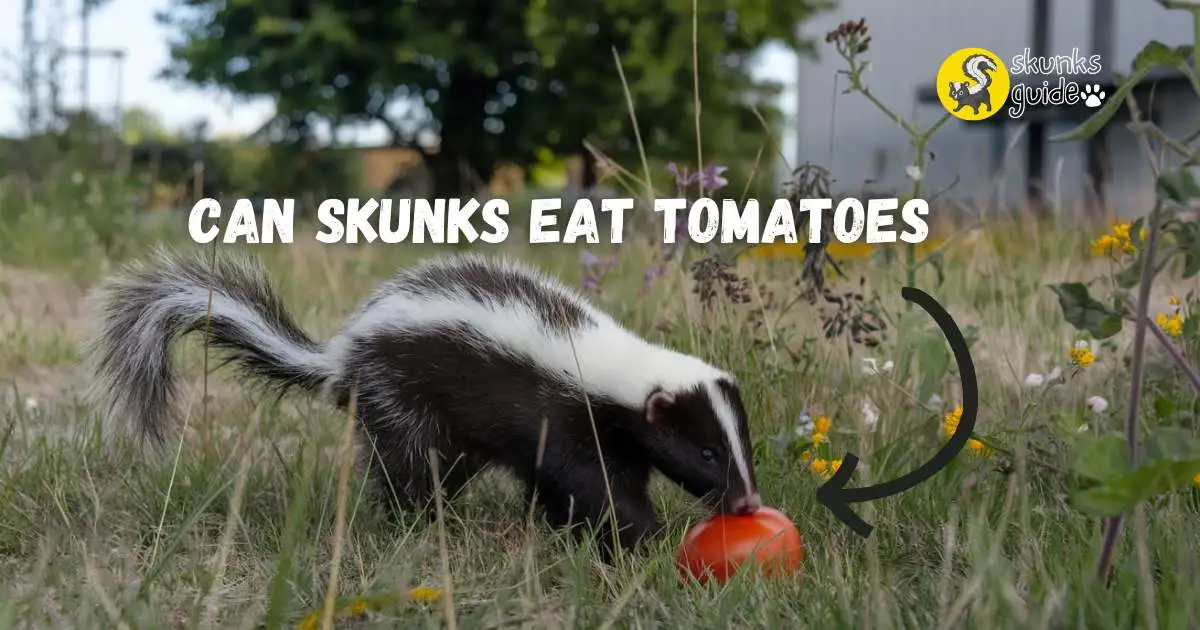Do Skunks Eat Garden Tomatoes? Explained
Last updated on November 4th, 2024 at 05:34 am
Yes, skunks do eat tomatoes. These omnivores will often raid gardens for ripe tomatoes.
Skunks are notorious for their distinctive smell and their occasional forays into gardens. What is less known is their varied diet, which includes insects, small mammals, and a variety of plant material. Tomatoes, with their soft, easy-to-bite texture and juicy nature, are no exception.
Skunks, while primarily nocturnal foragers, can cause noticeable damage to tomato plants, as they are attracted to the sweet smell of ripe, succulent fruits. Home gardeners may find half-eaten tomatoes or signs of digging around their plants as evidence of a skunk’s visit. To prevent these garden invasions, measures can be taken such as securing garbage cans, using deterrents, and installing fences. Understanding that skunks are part of the local ecosystem, coexisting with them requires balancing their feeding habits with our desire to protect our gardens.
The Secret Diet Of Skunks
Have you ever spied a skunk lurking in your garden and wondered what’s on its dinner menu? The answer might surprise you. Let’s unravel the mysteries of a skunk’s diet.
Skunks As Omnivores
Skunks boast an impressive range of tastes. They’re not picky eaters, embracing a diet that satisfies their omnivorous cravings. These furry critters enjoy both plants and small animals. They prey on insects, grubs, and earthworms, but they also have a taste for the crisp, fresh flavor of garden vegetables, including tomatoes.
Searching For Food: Skunks In The Wild
In their quest for food, skunks employ their keen senses. At night, they emerge to explore, sniffing out sources of sustenance. Skunks often dig small holes in search of insects and grubs but might stumble upon ripe tomatoes. These red treats offer a nutritious snack for the hungry scavenger.
| Skunks’ Favorite Foods | Where They Find Them |
|---|---|
| Insects and pests | Gardens and lawns |
| Fruits like tomatoes | Vegetable gardens |
| Small rodents | Under woodpiles or rocks |
| Garbage scraps | Urban and residential areas |
Understanding what skunks eat helps us coexist with these misunderstood creatures. Grasping their dietary habits can even save your tomatoes from becoming a midnight snack!
Tomatoes On The Menu?

Tomatoes on the Menu? Gardens are treasure troves of succulent fruits and vegetables, a paradise for creatures craving a midnight snack. One such stealthy visitor with a particular taste for ripe, juicy tomatoes is the skunk. These black and white critters are known for their pungent spray, but few realize their knack for snacking on garden goodies. The link between skunks and their liking for tomatoes raises eyebrows and questions among gardeners aiming to shield their produce.
Sneaky Nighttime Robbers
As the sun dips below the horizon, skunks begin their nightly raids. They prefer the cover of darkness to keep hidden from potential threats. Skunks are omnivores, meaning their diet isn’t limited to insects and small rodents. They have a soft spot for plants, especially those that bear fruits like tomatoes. Their love for these red delicacies might lead them straight to your garden patch.
- Soft soil makes it easier for skunks to dig.
- They have sharp claws that are ideal for pulling fruits down.
- Skunks leave behind holes as they search for grubs and worms.
Telltale Signs In Your Garden
How can you be sure that skunks are the culprits? Look for specific, identifiable signs.
| Sign | Explanation |
|---|---|
| Holes | Small, cone-shaped holes indicate skunk presence. |
| Tracks | Five-toed footprints, both front and rear, can be seen. |
| Odor | A faint musky smell lingers where they’ve been. |
| Half-eaten Tomatoes | Leftovers near the garden or bite marks on the fruit. |
Finding these clues can save the rest of your tomato batch. Look out for them often, especially if skunks are known to roam around your neighborhood. With a watchful eye and preventive measures, you can keep these sneaky nighttime robbers at bay.
Why Skunks Choose Tomatoes
Skunks are not picky eaters and often end up in backyards looking for food. Among their many dietary choices are ripe, juicy tomatoes, which they find quite delightful. But what’s behind this red-and-round temptation for skunks?
Nutritional Attraction
Tomatoes come packed with nutrients that are as beneficial for skunks as they are for humans. These include:
- Vitamins A and C – Essential for healthy skin and vision.
- Potassium – Helps with nerve function and muscle health.
- Fiber – Aids in digestion for a smoothly functioning system.
These attract skunks who need a well-rounded diet to thrive in the wild.
The Easy Picking Factor
Tomatoes often sit near ground level, making them perfect for skunks to reach. Here’s why:
| Reason | Description |
|---|---|
| Low Growth | Plants with tomatoes are close to the ground where skunks forage. |
| Soft Skin | Tomatoes are easy to bite into without much effort. |
| Bright Color | Their red color stands out at night when skunks are active. |
Skunks prefer easy access to food, and tomatoes provide just that.
Protecting Your Tomato Garden
Gardeners often find skunks cute but disagreeable guests. These nocturnal explorers sometimes munch on tomatoes. Skunks possess a diverse diet yet may visit gardens for a tomato treat. Ensuring some shrewd strategies can protect your tomato bounty from these striped intruders.
Physical Barriers And Fences
Creating strong defenses keeps these little bandits at bay. Erecting physical barriers makes tomato snatching a tough job for skunks.
- Wire Mesh: A fence with a tight wire mesh can block skunks. Bury it a foot deep to deter diggers.
- Raised Beds: Elevating your garden reduces skunk access to tomatoes.
- Floating Row Covers: Lightweight yet effective, these keep critters out while letting light in.
Combine methods for best results. Always check for gaps or weak spots regularly.
Natural Deterrents: What Works?
Natural Deterrents: What Works?
Skunks dislike certain smells and materials. Using natural deterrents helps keep your garden skunk-free.
- Motion-Activated Sprinklers: Startle skunks with a burst of water.
- Spicy Peppers: Mix chopped peppers and water. Spray around the garden. Skunks hate the burn.
- Citrus Peels: Scatter lemon or orange peels. Their strong scent repels skunks.
Regularly apply these deterrents. Natural solutions gently encourage skunks to dine elsewhere.
When Skunks Become Pests
Imagine stepping into your garden to find a salad bar that isn’t just for people.
Skunks, those striped night wanderers, might see your ripe tomatoes as an
all-you-can-eat buffet. Their notorious reputation doesn’t come unwarranted;
where food invites, mischiefs follow.
Common Skunk Mischiefs
While skunks are natural pest controllers, they can become
a bit too comfortable in our backyards. They dig for grubs, leaving
holes in lawns and gardens. Your lush tomatoes don’t stand
a chance when a skunk’s hunger strikes. These critters can also rummage
through trash bins, leaving a mess in their wake.
- Digging up lawns in search of insects
- Feasting on garden produce, such as tomatoes
- Toppling garbage cans for leftovers
Dealing With Skunk Intrusions
To safeguard your tomatoes, take steps to deter these black and white bandits.
Secure trash bins with tight lids, and consider a fenced enclosure
for your garden. Clean up fallen fruits promptly.
Motion-activated sprinklers can spook skunks without harm.
In case of a skunk entrenchment, professional removal services
are safest. Explore humane options; skunks are important parts of ecosystems.
| Prevention | Action |
|---|---|
| Garden Fencing | Enclose vulnerable areas |
| Trash Security | Use bins with locking lids |
| Repellent Tactics | Install motion-activated devices |
Understanding Skunks’ Eating Habits
Gardeners often wonder, “Do skunks eat tomatoes?” Skunks are omnivores with diverse palates. They indulge in various foods, based on what they find. During the ripe tomato season, skunks may visit gardens more often. It’s essential to understand what skunks eat and why they might target your tomato plants.

Seasonal Diet Changes
As seasons change, so do the diets of skunks. They adapt their eating habits to the food available. During spring and summer, they opt for insects and small rodents. When fall arrives, they turn to fruits and nuts, preparing for winter.
- Spring: Insects, larvae, earthworms
- Summer: Small rodents, reptiles, amphibians
- Fall: Fruits, nuts, crops like tomatoes
- Winter: Stored body fat, scarce food sources
Food Preferences And Availability
Skunks have favorite foods but eat what they can find. They are opportunistic feeders and roam around dusk and dawn. Skunks enjoy:
| Preferable Food Types | Examples |
|---|---|
| Animal Protein | Insects, small mammals, bird eggs |
| Plants and Fruits | Berries, fallen fruit, gardens |
| Human Waste | Garbage bins, compost piles |
In urban areas, skunks may rely on human scraps or pet food. In rural settings, they forage for natural offerings. Vegetable gardens, particularly with ripe tomatoes, become enticing targets.
Human-skunk Conflicts
Imagine walking into your garden to find your prized tomatoes have become a midnight snack. Now, imagine the culprit: a skunk! Skunks often wander into human territories, causing a stir among homeowners. Their quest for food can lead them straight to our tomato plants. Understanding the complex dynamic between humans and skunks is essential for coexisting peacefully.
Encroachment On Skunk Habitats
As cities expand, skunks lose their natural homes. They have to adapt to new environments where people live. This often leads to unwanted encounters. Many of these striped critters dig through gardens, searching for a meal. Our lush tomato plants offer a juicy target. Bold text: Encroachment on habitats forces skunks to become our unintended neighbors.
- Skunks look for shelter in urban areas.
- They sometimes feast on garden crops like tomatoes.
- Humans moving into skunk habitats sparks conflicts.
Finding A Middle Ground
Finding harmony requires effort from both sides. We can take steps to protect our gardens while respecting wildlife. For example, secure trash bins and use skunk repellents. Planting tomatoes in areas less accessible to skunks helps too. We must remember that skunks are not the enemy. They are wild animals trying to survive. Working towards a middle ground benefits everyone involved.
- Secure trash to deter skunks.
- Use safe, natural repellents in gardens.
- Understand skunk behavior and adapt accordingly.
Skunks In Culture And Myth
Skunks often appear in gardens searching for food, nibbling on various vegetation. Among the veggies, tomatoes tempt these furry critters. Yet beyond the garden, skunks hold significant spots in culture and myth, embodying diverse meanings and appearing in tales passed down through generations.
Symbolism Of Skunks
Skunks symbolize a variety of traits. Different cultures view these creatures through various lenses. Here are a few fascinating symbolic interpretations:
- Self-Defense: Their notorious spray links to protection and asserting boundaries.
- Confidence: Skunks strut with a unique self-assurance, teaching confidence without arrogance.
- Solitude: They often lead solitary lives, symbolizing independence and self-reliance.
- Patience: Skunks take time to warn before spraying, representing patience and restraint.
Skunks In Folklore And Stories
Throughout folklore, skunks feature in stories that showcase their cunning and comical nature.
| Region | Significance |
|---|---|
| Native American | Tribes tell tales where the skunk is a hero, using its spray as a mighty weapon. |
| American Folktales | In stories, the skunk often outsmarts larger animals, highlighting wit over brawn. |
| Modern Cartoons | Characters like Pepé Le Pew portray skunks as lovestruck, emphasizing their charismatic side. |
Skunk characters often add humor and moral lessons to stories. They remind us that despite their small size, they carry big lessons.
Frequently Asked Questions On Do Skunks Eat Tomatoes
Are Skunks Attracted To Tomato Plants?
Skunks are not particularly attracted to tomato plants. They usually seek out insects or grubs in the garden soil rather than the plants themselves.
What Animal Is Eating My Tomatoes At Night?
Common animals that might be eating your tomatoes at night include raccoons, squirrels, deer, and birds. Installing a fence or using repellents can help protect your garden.
Do Wild Animals Eat Tomato Plants?
Yes, some wild animals, such as deer, squirrels, and birds, may feed on tomato plants. These animals are often drawn to gardens for the ripe fruit and tender foliage.
Conclusion
Skunks may not be your ideal garden visitors, but their presence isn’t always disastrous. These creatures do munch on tomatoes occasionally, especially if other food is scarce. Securing your garden effectively can minimize such encounters. Remember, understanding wildlife habits is key to coexisting peacefully and keeping your tomatoes intact.

